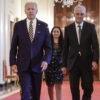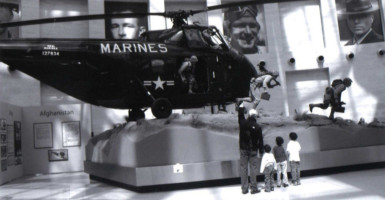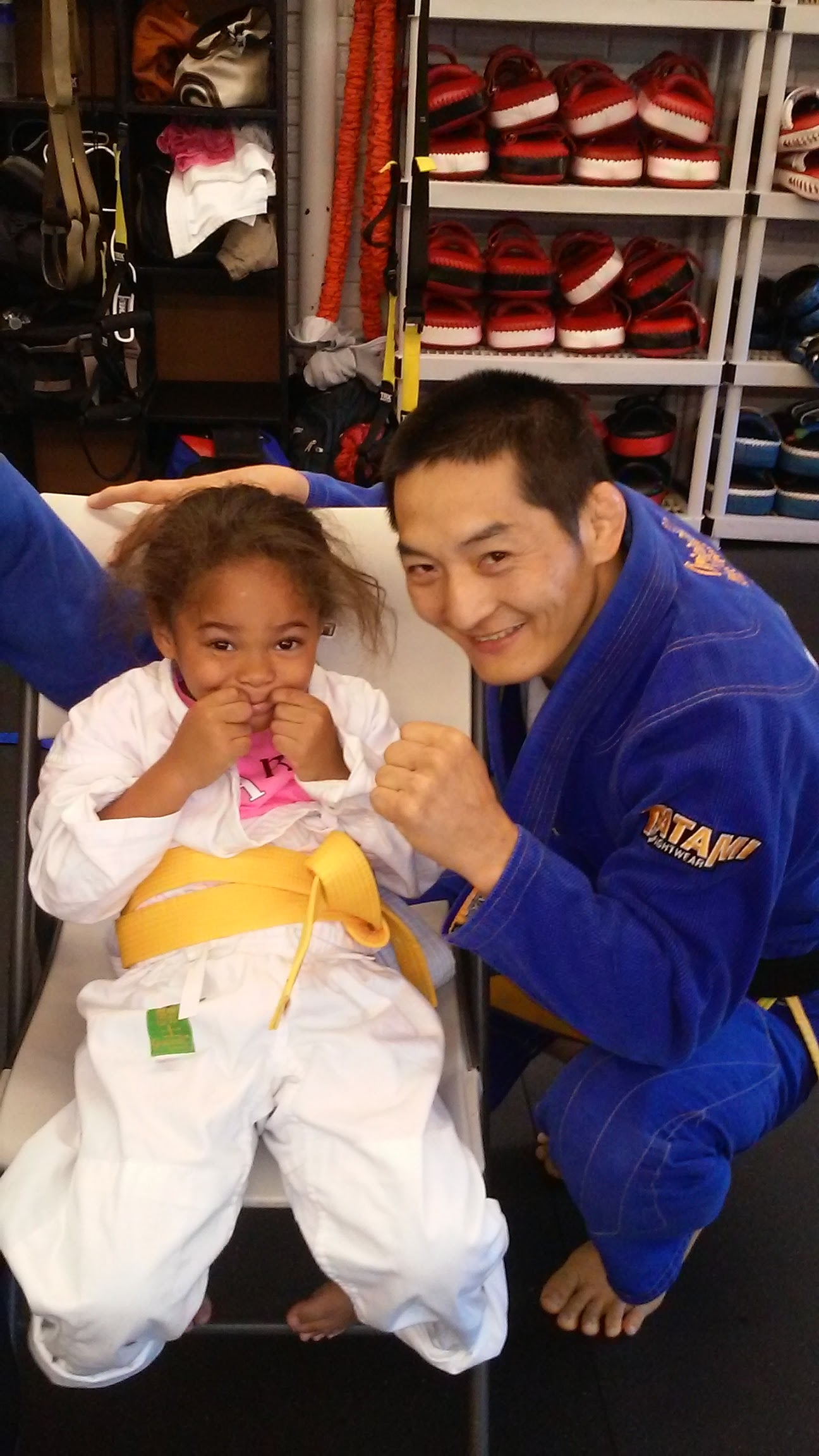Every Saturday, Jihee Ewart’s three sons, Logan, Scott, and Ryan fight for a spot in front of the computer in their Leesburg, Va., home, where they patch through a connection on Skype.
Half a world away on a military base in Jordan, Greg Ewart, the boys’ father, waits on the other end. Saturdays are Greg Ewart’s day off, and if the father of three has access to a computer, he connects with his family on video calls.
Greg Ewart is a reservist in the Navy, and in August, he left for a year-long deployment to the Middle East.
Saturdays are the perfect day for Jihee Ewart and her children to connect with Greg Ewart face-to-face, because, on those mornings, Logan, Scott, and Ryan take classes in Kempo, a blend of karate and kung fu, at the Ida Lee Park Recreation Center. When the three boys talk with their father after class—fighting for who will get access to him first—they often discuss the new skills they’ve learned.
“The timing can’t be better than that,” Jihee Ewart told The Daily Signal.
Greg Ewart himself took Kempo classes when he was in his 20s and 30s, and his sons, following in their father’s footsteps, have been learning the martial art for three years now.
The boys’ weekly Kempo classes have come at the ideal time for Jihee and Greg Ewart—Jihee worried that her sons would be hit hard by their father’s deployment, mainly because they would often practice the sport together. And with Greg gone a year, Jihee stressed about how their finances would be impacted. She feared they would have to cancel at least six months of their Kempo classes.
But thanks to a Virginia-based nonprofit called Our Military Kids, Logan, Scott, and Ryan have been able to continue their classes, finding a welcome distraction while their dad is away without putting a strain on the family’s budget.
“This is a way of saying, you know what, you guys deserve this because you’re not having your daddy here for a year,” Jihee Ewart said. “It’s nice that they can focus on something else other than sitting at home thinking about what else they can do without dad, so this is kind of a nice distraction for them.”
Our Military Kids provides grants to children of service members in the National Guard and Reserves, as well as to children of the wounded and fallen.
Through the program, Logan, 12, Scott, 10, and Ryan, 9, each received grants to take Kempo classes weekly at the rec center located near their house.
The organization launched more than a decade ago, and has expanded over time to serve more military families, Linda Davidson, Our Military Kids’ co-founder and executive director said.
“The impact has been much greater than I ever anticipated because it was going from a simple gesture of saying, ‘Thank you for your service,’ to having an impact on our servicemen and women,” she told The Daily Signal. “We recognize that there is a family there, and they, too, serve our country.”
Gratitude Over Charity
When Davidson started Our Military Kids in 2004, it was intended to be a way for her to thank the families of service members for sacrificing time spent with their loved ones so Davidson and her family, as well as millions of others nationwide, could be kept safe.
At the time, Davidson, who has no familial ties to the military, was working with Army reservists and National Guard members while setting up a nonprofit under an Army contract. After speaking with military spouses, she realized that when their husbands or wives were called up to deploy overseas, that often meant taking a financial hit since they left behind their day jobs to serve.
For many of those families now struggling to manage their smaller family budgets, their kids’ extracurricular activities were often the first to get the ax.
To help some of those families, Davidson started a volunteer effort to provide grants to children of service members funding the activities of their choosing.
At first, Davidson and her new organization began serving members of the National Guard in Maryland, Washington, D.C., and Virginia. But as service members spread the word about Our Military Kids, her volunteer effort exploded.
“When the family is in a stressful situation and the children are anxious and stressed, it’s a time the extracurriculars become more important,” Davidson said. “If they’re not in an activity, they should have something to distract them when they’re undergoing their stress.”
To date, Our Military Kids has given 53,000 grants to children nationwide and in U.S. territories.
Though the nonprofit originally served only those in the Reserves and National Guard—which Davidson said helps families connect to their local communities since they don’t have support from a nearby base—Our Military Kids expanded in 2008 to include children of those wounded and the fallen.
“It goes beyond financial support,” Davidson said of the grants her organization provides. “It means so much to know strangers appreciate their service and sacrifice, and recognize military families do exist living in our communities, and we’re saying thank you for your service, and helping to support their most precious asset.”
Each of the grants Our Military Kids provides is worth up to $500, and they cover activity fees for up to six months.
Since its inception, the organization has given grants to children involved in sports programs, the fine arts, and to those who need tutoring for college placement exams or want to become involved in STEM programs. Two children in Louisiana and Oklahoma even used Our Military Kids grants to raise a prize-winning goat and prize-winning steer, respectively, through 4-H projects.
For eight years, Our Military Kids received funding through grants awarded by the National Guard, though the amount of funding sometimes varied. But in July 2014, when the Pentagon enacted steep budget cuts, funding opportunities for Our Military Kids were cut.
Now, the group entirely relies on private-sector funds and donations.
In addition to focusing solely on military families, and specifically their children, Our Military Kids differs from other military-focused nonprofits in the percentage of money it spends directly on beneficiaries.
According to Charity Navigator, 92 percent of Our Military Kids’ budget goes toward funding its programs. By comparison, the Wounded Warrior Project spends 59.9 percent of its expenses on programs and services, and TAPS, the Tragedy Assistance Program for Survivors, spends 81.5 percent of its expenses on programs and services.
“We really want each donated dollar to help as many children as we can,” Davidson said. “When our donors write that check, that’s what we’re expecting. They’re expecting kids to play baseball. They’re not writing a check for us to advertise or receive big salaries.”
Unlike other organizations that are household names, Our Military Kids has flown under the radar since its inception. For Davidson, that can be both a blessing and a curse.
“My biggest fear is that we as a nation are not recognizing there are a lot of families impacted by overseas deployment, and because of budget cuts, there are less support services,” Davidson said. “Our nation was aware of the dangers five years ago, but those going now, the numbers are lower, but there are still a large number going [overseas] and they deserve our support, too.”
Lessons of Mixed Martial Arts
Sarah Padilla, 5, is easily the smallest child participating in a mixed martial arts class at Pentagon Mixed Martial Arts on this Monday afternoon.
With her thick, curly hair pulled back in a ponytail and stark white uniform, held closed by the yellow belt— earned in October—tied around her waist, she, and a class of a dozen other children, are learning the craft.
Together, they punch, kick, and spar with one another through their 30-minute lesson.
Sarah Padilla’s interest in mixed martial arts began when Padilla and her mother, Ray Payton, were taking a trip to the farmers market located near Pentagon Mixed Martial Arts. As they headed to the market and passed by the gym, Padilla, who was 3 years old at the time, stood watching a group train through an open garage door.
Payton had a hard time prying her daughter away and decided to enroll her in courses not long after. A grant from Our Military Kids funded her first 26 classes.
It was Sarah Padilla’s Marine Corps father, Raphael, who first heard about the organization after he was wounded and receiving care at Camp Lejeune in North Carolina.
Raphael and Ray are divorced, and Sarah Padilla didn’t meet her father until she was nine months old. Her father was deployed to the Middle East when she was born and was stationed in North Carolina.
Payton filled out an application with the nonprofit through its wounded warrior program. Within days, Payton learned her daughter qualified for a grant for more than two dozen mixed martial arts classes lasting 13 weeks.
“She’s a strong, independent child, but it’s expensive to be put in other activities,” Payton said. “I’ll give to church and [other charities], but it was very odd to need help myself.”
Sarah Padilla continues to attend two 30-minute mixed martial arts classes per week, though she no longer receives grants from Our Military Kids.
“I didn’t know about Our Military Kids,” Payton said. “I never would’ve thought it was out there and the difference it made in my child’s life.”
Since starting mixed martial arts, Payton has noticed a change in her child. Though she may end up a bit bruised and scratched after sparring with her classmates at the gym—and has even come off the mat with a bloody nose—Payton said Padilla has become more focused and disciplined.
“She wouldn’t be as focused as she is,” Payton said of her daughter. “Maturity naturally happens, and [her mixed martial arts teachers] keep reiterating how much she’s grown.”
When Padilla tested for her yellow belt in October, her father, himself a green belt in karate, came from North Carolina to watch.
Padilla earned a red stripe on her yellow belt earlier this week, and Payton expects her daughter will test for her green belt within the next three weeks.
Remembering Those Left at Home
During separate conversations with The Daily Signal, Jihee Ewart and Payton became emotional when talking about the help that Our Military Kids has provided them.
Both mothers admitted it wasn’t in their nature to ask for help, and they’ve even had feelings of guilt for accepting grants from the organization. But Ewart and Payton expressed sincere gratitude for Our Military Kids, particularly because it has helped their children.
“Different organizations always pay attention to military members,” Payton said as she watched her daughter’s class. “But sometimes you forget the people left at home—the person left behind to do everything.”
“Because I don’t have a wound,” she continued, “people don’t think you have a need.”
Ewart’s husband doesn’t return from a deployment until June, and she, unlike service members on active duty, doesn’t have a close network of military spouses around that other families living on or near a base do—a challenge Davidson, Our Military Kids’ co-founder, recognized when she first started her organization.
Over the last nine months, Ewart has found herself turning to Our Military Kids for support, corresponding with staff on the phone and through email.
“Even if I meet a family that’s active duty and they have kids, I understand it now more than I did before,” Ewart said. “The friends that I live around, they don’t have husbands or wives that deploy.”
For Davidson, hearing from military spouses like Ewart and Payton has reaffirmed the mission of Our Military Kids and serves as a reminder that her organization isn’t a charity, but rather a program of recognition.
“When we started the program 12 years ago, I wanted to make sure this did not appear to be a charity,” Davidson said. “Our servicemen and women are very proud, and there’s no expectation on their part. I wanted them to feel appreciated, and I wanted a way to say thank you for your service.
“My family isn’t serving, and in a small way, I want to say thank you, military family, for volunteering to protect.”




































